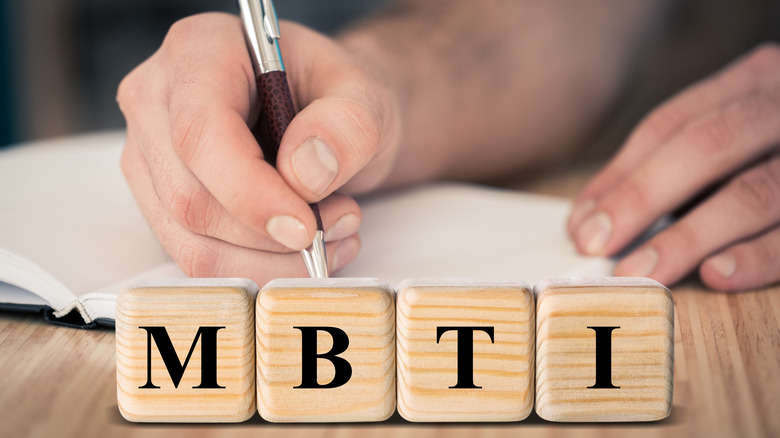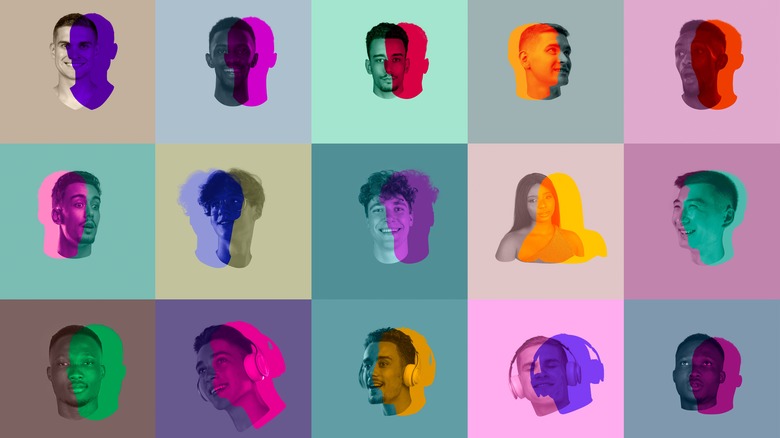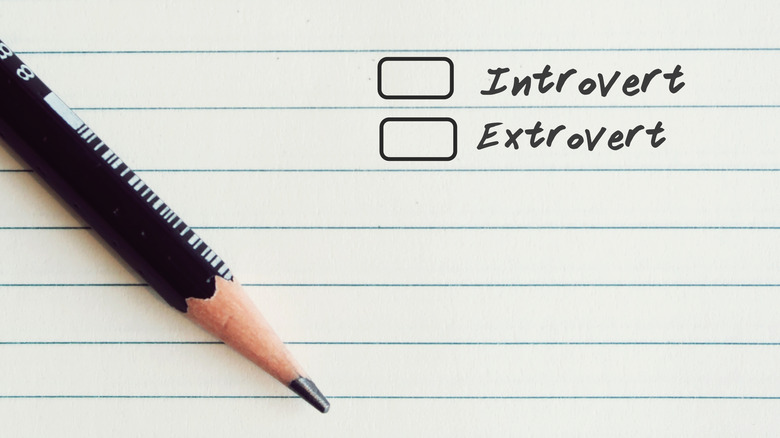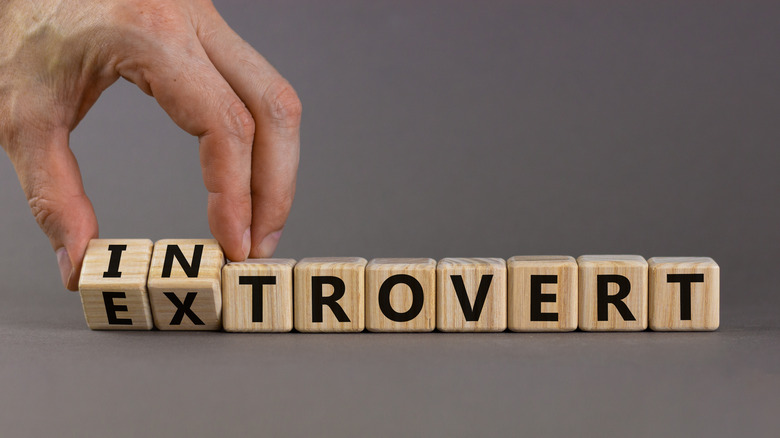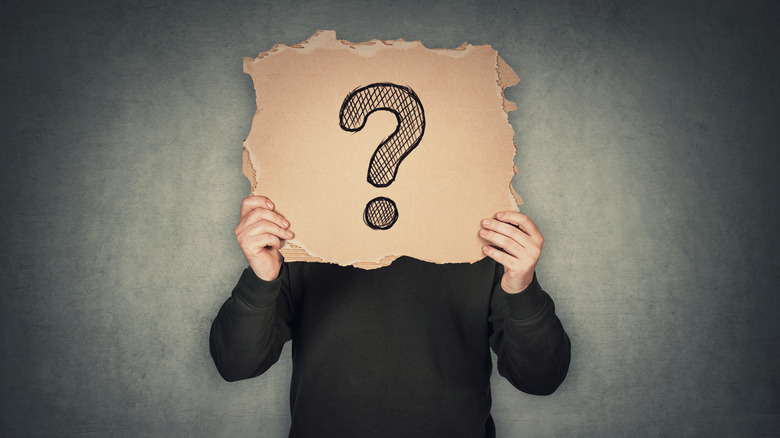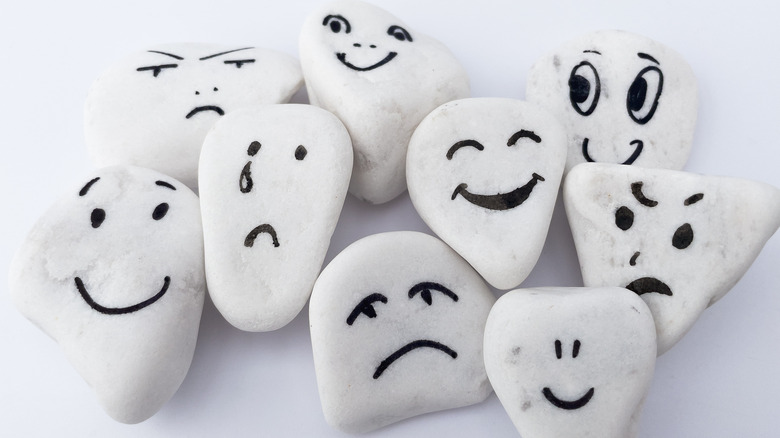The Science Of The Myers-Briggs Personality Types Explained
The Myers-Briggs Type Indicator (MBTI) is one of the most popular personality tests in the world. It's estimated that more than two million people take the test annually (via Imperial College London). Despite its fame, however, the MBTI has been widely challenged and is often considered as pseudoscience (via Frontiers in Psychology). There are some therapists that think it's valid, while many psychologists have criticized it for being ineffective.
The MBTI is a self-report questionnaire that aims to categorize a respondent's personality into one of sixteen types (via The Myers & Briggs Foundation). The results are based on the individual's preferences in various areas of life, including where they focus their attention or how they energize themselves. Some researchers say that the MBTI provides a somewhat reductive picture of an individual's personality, since the profiles it presents aren't comprehensive enough (via Journal of Management). According to the Myers & Briggs Foundation website, the content is backed by psychological principles and largely based on Carl Jung's age-old theories. Read on to find out more about the history and research behind the Myers-Briggs personality types.
The history of the MBTI
The MBTI was created in 1943 by Katharine Cook Briggs and her daughter Isabel Briggs Myers (via The Myers-Briggs Company). Briggs was fascinated by people and their individual differences. She began delving into people's biographies and studying their unique personalities, which led to the formation of a system of typology. Inspired by her mother's work, Myers decided to join forces with Briggs. The pair became passionate about developing a personality indicator that could be used to help people understand themselves better and gain some insight into their strengths and tendencies.
A criticism that's often leveled at the test is that the inventors weren't psychologists. This has led many detractors of the MBTI to argue that the ideas behind the instrument are highly speculative and unreliable. However, many innovative, useful, and even revolutionary ideas have come from people who have lacked a formal academic background, points out the Myers-Briggs Company website.
The MBTI is based on Carl Jung's theory of psychological types
The MBTI was inspired by Carl Jung, a Swiss psychoanalyst, psychiatrist, and founder of analytical psychology (via The Myers-Briggs Company). The test was largely based on Jung's theories about personality, since the creators, Briggs and Myers, had studied his work extensively. In particular, upon reading his book "Psychological Types," Briggs noticed the many exciting similarities between Jung's ideas and her own. This led Briggs and her daughter to devote their efforts toward refining Jung's theory and crafting an assessment tool that people could use to identify and understand their personalities.
Researchers often highlight the fact that unlike the MBTI, Jung believed that personality types were general tendencies rather than rigid prescriptions (via Frontiers in Psychology). However, the Myers-Briggs Company website notes that Jung was simply advising his readers to approach the theory of personality types with some flexibility; after all, human personality is deeply complex and multi-faceted.
What Are the MBTI Personality Types?
The MBTI assessment poses a series of questions about your natural preferences in four main areas of life (via The Myers & Briggs Foundation). Based on your combination of responses, you're then assigned one of the 16 personality types, such as INTJ, ENFP, and more. Each category is then further broken down into four components, which offers some insight into your psychological tendencies.
The questions aim to discover how you receive or direct your energy, how you perceive reality and make sense of information, how you make decisions and judgements, and how you approach the world around you (via The Myers-Briggs Company). Extroverts tend to focus on people and the outside world, whereas introverts focus inwards and are energized by solitude. Some people prefer to focus on information gathered by the five senses, while others may look out for patterns and associations. Thinkers often draw conclusions by logically analyzing situations, whereas feelers consider how a certain decision will affect other people. And then there are those who live their lives in a planned and orderly way compared to individuals who prefer to approach things flexibly and spontaneously.
How does the MBTI work?
There are currently four different versions of the MBTI (via The Myers & Briggs Foundation). The standard form of the test includes 93 multiple choice questions. This can be self-administered online via MBTI, and users get access to both the questionnaire and a professional interpretation of their results.
While the MBTI-branded version must be paid for, there are numerous free tests and quizzes available online that purport to offer the same thing as the MBTI, such as the 16 Personalities test. However, the MBTIonline website states that these free versions do not use the official MBTI assessment, nor do they provide your verified MBTI type.
There are also longer versions of the MBTI available, including a 144-item questionnaire and a form with 222 questions (via The Myers & Briggs Foundation). These forms are designed to offer a more nuanced picture of individual differences within type, providing a lot more information than the shorter questionnaire. They're typically used by people who want to receive in-depth feedback about their personality and preferences.
Other than the online version, the MBTI is often administered by a trained and certified professional. This may be a coach or counselor who can assist with the interpretation of the results either in person or via a personalized phone call.
There is little evidence for dichotomies
The MBTI is based on the extraversion-introversion dichotomy, which was first investigated by Jung in his exploration of personality types (via The Myers-Briggs Company). The test presents four main dichotomies: introvert (I) and extrovert (E), sensing (S) and intuition (N), thinking (T) and feeling (F) and judging (J) and perceiving (P). The basic idea is that people innately prefer one of the traits on each dichotomy (via The Myers-Briggs Company).
However, a common criticism is that the MBTI pigeonholes people, and yet there's actually very little evidence for dichotomies in science. Researchers say that personality traits exist along a spectrum rather than as binaries (via Social and Personality Psychology Compass). The traits on either end of the spectrum are neither independent nor opposites of one another, therefore, per the article authors, "it does not make sense to say that people are born with a preference for one or the other."
Most people exhibit both traits, such as extraversion or introversion, to some degree, says the Myers-Briggs Company, highlighting that even Jung himself believed that no one is purely an extrovert or introvert. However, some people may "over-engage" a particular trait and exclude other parts of themselves. Per the Myers-Briggs company website, "[Jung] was clear that while every person will have a preference toward Extraversion or Introversion, every person needs to [be] both extravert and introvert."
It's commonly used to predict job success
The MBTI was invented during World War II, at a time of increasing job satisfaction (via Owlcation). The inventors believed that by knowing more about their personality type, people could identify the sorts of jobs that would be most satisfying and suitable for them. However, research has shown that the MBTI isn't particularly effective at predicting how happy or successful people will be in different jobs (via Review of Educational Research). The tool doesn't indicate job satisfaction in physicians nor other health professions, reports a study published in the Asian Journal of Management, and it doesn't say anything about specialty choice and academic performances in medical students. In fact, it's not uncommon for people to get different scores when they take the test twice (via Review of Educational Research).
The Myers-Briggs Company website notes that it's a common misconception that the MBTI is designed for recruitment purposes. "Knowing your MBTI type may, for example, prove helpful in deciding what specific areas of law, medicine, education, or business a person prefers," according to The Myers & Briggs Foundation. But it shouldn't be used to determine job suitability, or for employee selection.
The test has been criticized by psychologists
Psychologists and researchers have criticized the MBTI scales for a number of different reasons. According to an article published in the Consulting Psychology Journal: Practice and Research, the questionnaire has low test-retest reliability. In other words, a large number of respondents get different results when they retake the test a few weeks later. The study author challenges the MBTI's usefulness in corporate settings — which is ironically where it's used most frequently. On the other hand, some studies have found that the MBTI can be used as a fairly reliable measure of personality, and that most people who retake the test receive the same scores (via Owlcation).
It's suggested that the MBTI may lack objectivity (via Discover Magazine). The results stem from people's evaluations of themselves, therefore the accuracy of these descriptions depend on candid self-reporting, which isn't always easy to achieve. Some people may be inclined to withhold, inflate, or exaggerate their responses, and there's no way to control for this in the data.
Why is the MBTI so appealing?
People are generally drawn to personality tests because we like to understand ourselves (via Insider). Even if the MBTI may not be scientifically accurate, we take it in the hope that we may learn something new about ourselves, say researchers (via Social and Personality Psychology Compass). But the assessment has been criticized for offering vague and generic descriptions so that any individual can easily identify with them. Oftentimes, these profiles are positive and flattering, which makes it easy, if not desirable, for people to accept them as true. This psychological phenomenon is referred to as the "Forer effect," which might also explain why astrology, fortune telling, and other forms of pseudoscience tend to be so convincing despite lacking scientific credibility.
But The Myers-Briggs Company insists that the MBTI is neutral: It is not intended to highlight which characteristics are good versus bad, nor is it diagnostic. And many of the MBTI resources are said to discuss the specific challenges that each personality type may face, as well as their different areas of personal development.
The MBTI has its perks
One of the reasons that people may feel inclined to take the MBTI test is its popularity (via The Guardian). People use it because they hear about other people using about it. This makes it an easy conversation starter, and also a topic that allows people to connect with one another (while still talking about themselves). People also enjoy taking the MBTI because it's light and simple, a bit like a Buzzfeed quiz, notes an article published in The New York Times. There's something surprisingly satisfying about the process, as people generally find it comforting to identify with a particular category, according to psychologists.
The assessment tool is estimated to generate around $20 million annually for its publishers, which might also help unravel the mystery behind its continued popularity, notes The Guardian. This amount of money doesn't derive from individual use: The test is used by many employees within public and private institutions, charities, militaries, and various sports teams.
Can the MBTI help people understand themselves?
Some researchers have argued that the MBTI can still be useful, even if it's not entirely accurate (via Social and Personality Psychology Compass). The broad descriptions can offer people some insight into their personalities and get them to think about things in a different way, though the personality types may not be specific enough to actually inform someone's decisions and should be taken with a pinch of salt.
"We are fundamentally driven to understand ourselves and others, and often seek that understanding in the form of labels that can stand in for complicated ideas," Jaime Lane Derringer, a psychologist at the University of Illinois, Urbana-Champaign, told Discover Magazine, adding that: "The idea of being able to know a person from a single word or acronym is appealing because, if accurate, it would save us a lot of time. But we're more complicated than that, and there are certainly more than 16 types of people in the world."

